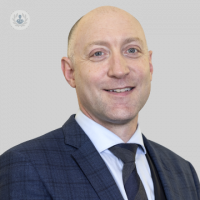All we need to know about prostate cancer and PSA testing
Written in association with:In this article below, highly respected consultant urologist, Professor Greg Shaw, delves into the topic of PSA testing, breaking down what factors lead to a raised PSA, and how this type of test can help in the diagnostic process of prostate cancer.

What is a normal PSA level?
Prostate Specific Antigen (PSA) testing has become a routine procedure in the UK for men considered to be at risk of prostate cancer. Understanding what constitutes a normal PSA level is crucial for interpreting test results accurately.
PSA, an enzyme produced by the prostate gland, can be detected in small amounts in the blood. However, interpreting PSA levels requires context. Factors like urinary infections, recent trauma, or benign prostatic enlargement can influence PSA levels, making it necessary to consider these factors before drawing conclusions.
Traditionally, age-specific PSA cut-offs have been used to determine whether further investigation is necessary. However, this approach oversimplifies the assessment, as it doesn't account for individual differences in life expectancy, family history, ethnicity, or prostate size.
Benign prostatic enlargement is common as men age, and benign prostate tissue produces PSA. Therefore, PSA levels should be considered in the context of prostate size. PSA density, calculated by dividing serum PSA level by prostate volume, provides a more accurate indication of prostate cancer risk.
In cases of elevated PSA levels, further investigation typically involves a multi-parametric MRI scan. This imaging technique not only assesses prostate volume accurately but also identifies suspicious areas for biopsy, aiding in the diagnosis of prostate cancer.
There is no universal PSA cut-off for all men, except for extremely low levels (<1ng/mL at 60 years old). Risk assessment for prostate cancer depends on various factors, including age, medical history, and PSA level in conjunction with other health conditions.
When should I seek a specialist consultation?
If concerned about PSA levels or at higher risk due to family history or ethnicity, consulting a specialist urologist is essential. Specialist urologists possess the expertise to interpret PSA levels in context and recommend further investigations or treatment accordingly.
Why is it important to measure PSA levels?
Understanding PSA levels and their significance in prostate cancer diagnosis requires careful consideration of various factors. By seeking specialist consultation and utilising advanced imaging techniques, individuals can make informed decisions regarding further investigation and treatment options.
For personalised assessment and expert consultation on prostate cancer concerns, consider booking an appointment with a specialist urologist at the Prostate Centre. Expertise and guidance from specialists like Professor Greg Shaw can provide valuable insights into prostate health and cancer management.
If you’d like to find out more about your PSA level, you can book an appointment with Professor Greg Shaw today via his Top Doctors profile.


